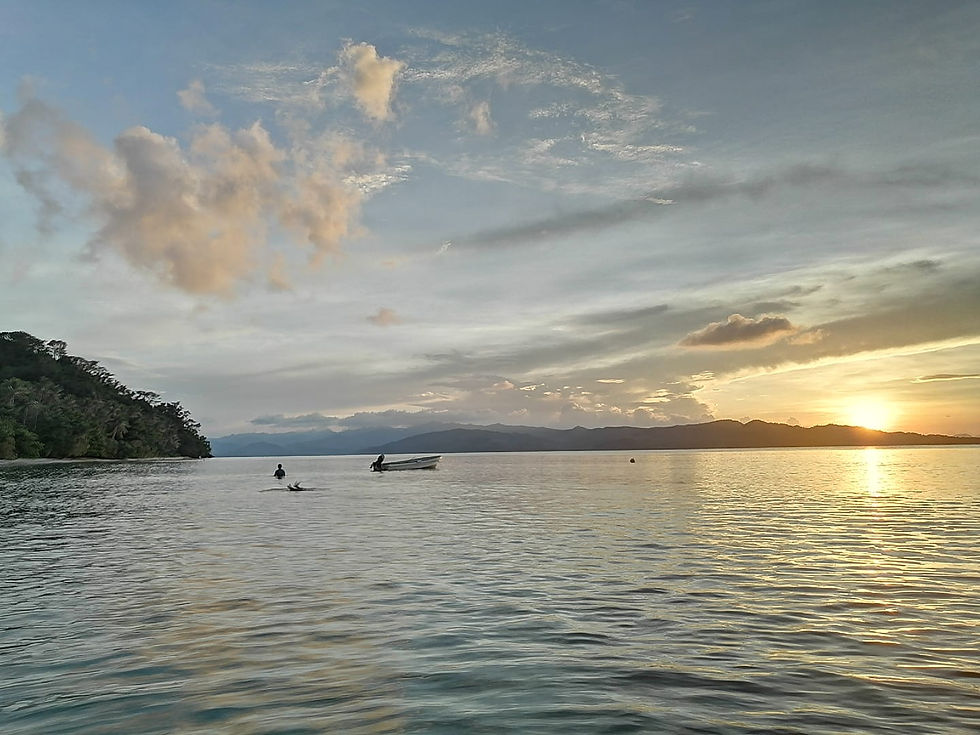
Travelling to the nearest town (Savusavu), from Rabi (1) takes about half a day covering about over 80 kms, depending on where you're travelling from on the island.
Anyone who has travelled this route via Napuka, Karoko or Tukavesi would have had some or all of these different weather experiences. The crossing can be very pleasant on a good day but can also be challenging with seas rising up to 2-3 meters.
Banaban boat men and fishermen (2) are very skilled and can manoeuvre to safety, but we have a shared responsibility and a duty of care to put in place safety measures. On a good practice, we can take control of our safety by implementing them in our villages and through the support and supply of the private sector on Rabi.
Every boatmen should have:
1. Life jackets 2. Epirb 3. Radio 4. Compliance to minimum safety standard

If this has been done, enforcement needs to be implemented. We cannot risk the lives of passengers (3) who commute to Savusavu every week to do business especially young travellers and Persons with Disabilities (4).
26 April 2021
Uma, Rabi
The Banabans first arrived on Rabi Island, Fiji at the end of World War II, with exaggerated reports from the British government that all of the villages of the island had been destroyed, the Banabans were gathered and taken to Rabi in Fiji, over 3,200 kilometres away. On 15 December 1945, 703 ill-treated and weary Banabans, of whom 318 were children, and 300 Gilbertese arrived at their new home.
Banabans are known as skilled ocean seafarers and still practice traditional fishing skills passed down by generations from their homeland Banaba in the Central Pacific. "Traditional Methods of Banaban Fishing" Blog: 3 Sept 2019.
"Six-year-old Girl Relives sea ordeal" (between Rabi Island and Karoko), Fiji Times 15 June, 2020.
"Accessibility for People With Disabilities Today on Rabi Island Fiji" Blog: 21 April 2021

Itinterunga Rae Bainteiti
BA Social Work (Hons, Massey University, current), Cert Project Management (KIT) 2013- Dip Business Accounting (FNU) 2009- Her Majesty the Queen 2018 Point of Light Award for youth voluntary service.
Rae is of Banaban and Kiribati origins, raised and educated in Fiji throughout his childhood. His grandparents were forced to relocate to Rabi in Fiji from Banaba Island in 1945 after the British mined the island extensively for phosphate. His environmental, social justice work is linked to the history of his people and the degradation caused by mining.
He has extensive involvement in Local Government and NGOs, including Kiribati Local Government Association and the Kiribati Climate Action Network. He was a co-founder of several youth organisations, including Kiribati Against Corruption and the Kiribati National Youth Association of NGOs.
Rae is a passionate community and youth worker with interests in mental health, domestic violence, and social justice. During his studies in New Zealand, he interned at Mahu Vision Community Trust and Ember. He also co-founded the Kiribati Aotearoa Diaspora Directorate Charitable Trust in 2018 and the Auckland Banaban Christian Fellowship Support Hub in 2020.
Rae currently serves as a Board member of the Pacific Climate Action Network, Pacific Youth.
Email: raekccn@gmail.com

Comments